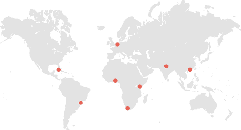Curitiba is well known as an innovative city, praised for its system of public transportation and waste management, and overall as one of the most successful and liveable Brazilian cities. Yet, as the city continues to expand, the once revolutionary system of transportation falls short and needs to be reinvented. Curitiba is a city of which other New Towns can learn a lot, also because it continues to develop its own urban metabolism. In order to exchange Curitiba’s successes, without hindering its own learning processes, Curitiba has connected with Almere (NL). These two cities with similar interests in urban agriculture, recycling waste and environmental regulations can learn a lot from each other as they share the same green ambitions.
Over the past few decades, Curitiba has become well-known as an innovative and sustainable city under the leadership of its inspiring mayor Jaime Lerner. Starting in the sixties, Lerner initiated a large number of remarkably progressive urban projects, such as the introduction of cheap and high quality public transport with buses and dedicated bus lanes (Bus Rapid Transit); the stimulation of healthy food production and consumption, stimulation of recycling through a system which rewards residents with food and bus tickets; the improvement of water management by building parks instead of sluicing water via canals as usual; and various other admirable urban endeavors.
Of all these green forms of urban planning, Curitiba’s methods of waste management and healthy food promotion may be most outstanding. Without a budget for a standard recycling plant, the city started the ‘Lixo que nao è Lixo; (garbage that it is not garbage) and ‘Cambio Verde’ (green exchange) programs. ‘Lixo que nao e Lixo’ is the program by means of which the city established complementary currencies to reward people for separating their organic and non-organic recyclable wastes and bringing them to waste stations, where they can be exchanged for public transport tickets, food, and school-books. ‘Cambio Verde’ is the program that incorporates locally grown, organic, healthy foods into this recycling program. Recycling citizens receive these foods in exchange for their recyclable waste or can buy them at 30% cheaper prices than in regular stores.
Largely thanks to these projects, Curitiba has become one of the most livable cities in Brazil and ranks high on the list of the Human Development Index. In 2010 the city won the Global Sustainable City Award, given to cities which set an example in sustainable urban development in terms of urban landscapes, citizen participation, education and health care.
Greening and Energizing
The future cooperation between Almere and Curitiba will focus on two themes: Greening and Energizing. The year 2016 will be dedicated to formulating the most relevant issues within these themes. Curitiba is praised for its public transport system, its large-scale recycling programs and its urban parks, but also has to deal with two urgent challenges which affect the wider region of Curitiba, Sao Paulo en Belo Horizonte: water management and mobility (the bicycling trend).
The region has been suffering from a shortage of water for a longer time. Gigantic lakes in the region, which used to serve as water reservoirs, have dried out; many neighborhoods, mostly deprived areas, are put on a ration. Citizens run the risk of being fined when washing the car or spraying the lawn. INTI’s New New Towns program will focus on Curitiba in general, but INTI will also pay particular attention to the improvement of an informal city at Curitiba’s borders: Campos de Santana. This relatively small ‘urban village’ has a lot of industry and informal urban agriculture, but is badly connected to Curitiba itself and relatively poor. Curitiba’s urban planning department views this area as a suitable testing ground for Dutch expertise on various topics which are relevant in the improvement of the neighborhood. The Netherlands has an enormous knowledge and experience in water management. Almere is a city built in water. On this subject, Almere has a lot to offer.
The second topic which could provide an fruitful field for cooperation between Almere and Curitiba is mobility. Despite the innovative and well functioning public transport system, Curitiba (like Brazil overall) remains a car-dominated city. However, recent years have shown the rise of a strong anti-car movement, in which the bicycle is central. In the cities which support this anti-car movement, the infrastructure (streets) has been changed to accommodate the bicycle, and car lanes have been transformed into bike lanes. This is also a subject where the Netherlands have a lot of experience to offer.

People lining up to exchange their waste for bustickets or food. The program ‘Garbage that is nog garbage’ is a way to recycle and clean the neighbourhoods at the same time. (photo: International Sustainable Solutions)

Since 1989, Curitiba runs an innovative program, ‘Green exchange’ in which residents can exchange 4 kilo recyclables for 1 kilo vegetables. (source: "Green Exchange. An appetite for recycling", Panasonic Ecoideasnet)

The innovative bus system which Curitiba is famous for, cannot handle the pressure of today’s traffic anymore and needs to be modified. (photo: Simone Rots)

Curitiba has started to build a network of comfortable paths to stimulate the use of bicycles. (photo: Simone Rots)

